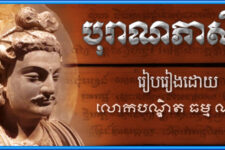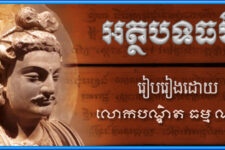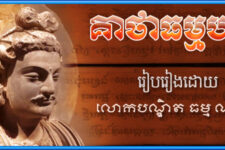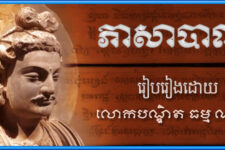ពុទ្ធវចនៈក្នុងធម្មបទ គាថាទី ២៥
វីរិយភាពនឹងជួយសាងទីពឹងសម្រាប់ខ្លួន
BY THEIR EFFORTS THE WISE CREATE THEIR OWN HEAVENS
उट्ठानेनप्पमादेन , संयमेन दमेन च।
दीपं कयिराथ मेधावी, यं ओघो नाभिकीरति॥
ក្នុងពុទ្ធវចនៈក្នុងធម្មបទគាថាទី ២៤ កន្លងទៅ ខ្ញុំបានយកបាលីដែលសរសេរដោយតួអក្សរគុជរ៉ាទ្រី (Gujarati) មកបង្ហាញ ។ ក្នុងគាថាទី ២៥ នេះ ខ្ញុំសូមយកតួទេវនាគរី (Devanagari) មកបង្ហាញម្ដង ដើម្បីឱ្យមើលប្រៀបធៀបគ្នារវាងតួគុជរ៉ាទ្រីនិងតួទេវនាគរី ដែលមានលក្ខណៈប្រហាក់ប្រហែលគ្នាច្រើន អ្នកចេះអានតួទេវនាគរីអាចអានតួគុជរ៉ាទ្រីបានដោយមិនបាច់រៀន ដែលប្លែកគ្នាគឺតួគុជរ៉ាទ្រីមិនមានគូសពីលើ និងមានតួខ្លះមិនដូចតួទេវនាគរីប៉ុណ្ណោះ ចំណែកសេចក្ដីក៏ដូចភាសាបាលីតួអក្សរខ្មែរខាងក្រោមនេះ
——————————————
ឧដ្ឋានេនប្បមាទេន, សំយមេន ទមេន ច;
ទីបំ កយិរាថ មេធាវី, យំ ឱឃោ នាភិកីរតិ ។
ដោយសេចក្ដីប្រឹងប្រែង ដោយសេចក្ដីមិនប្រមាទ ដោយសេចក្ដីសង្រួម និងដោយការទូន្មានខ្លួន អ្នកមានប្រាជ្ញាគប្បីសាងកោះ(ទីពឹង)ចំពោះខ្លួន ដែលជំនន់(កិលេស)មិនអាចលិចបាន ។
Uṭṭhānenappamādena, saṃyamena damena ca;
Dīpaṃ(1) kayirātha medhāvī, yaṃ ogho nābhikīrati.
By sustained effort, earnestness, discipline, and self-control let the wise man make for himself an island,(1) which no flood overwhelms.
——————————————–
Story: រឿងព្រះចូឡបន្ថកៈ
A young monk, named Cūlapanthaka, could not memorize a verse of four lines despite trying for four months and he was advised by his brother monk to leave the Order. But he was reluctant to do so. The Buddha, understanding his temperament, gave him a clean pieces of cloth and asked him to handle it gazing at the morning sun. By his constant handling of it with his sweating hands it soon got soiled. This perceptible change made him reflect on the impermanence of life. He meditated and attained Arahantship.
——————————————
(1) An island situated on a higher level cannot be flooded although the surrounding lowlying land may be inundated. Such an island becomes a refuge to all. In the same way the wise man who develops insight should make an island of himself by attaining Arahantship so that he may not be drowned by the four floods of sense-desires (Kāma), false beliefs (diṭṭhi), craving for existence (bhava), and ignorance (avijjā). (ឱឃៈ ៤ គឺ កាមោឃៈ អន្លង់កាម, ទិដ្ឋោឃៈ អន្លង់ទិដ្ឋិ, ភវោឃៈ អន្លង់ភព, អវិជ្ជោឃៈ អន្លង់អវិជ្ជា)
រឿងព្រះចូឡបន្ថកៈនេះ ជាតួយ៉ាងផលនៃការមើលងាយអ្នកដទៃថាល្ងង់ ដែលគួរយើងទទួលពិចារណាដោយប្រុងប្រយ័ត្ន ។
——————————————-
Source: Dhammapada: Appamāda Vagga; translated with brief stories by Nārada Thera (2522-1978)
ប្រែពីបាឡីជាភាសាខ្មែរដោយ តាអារាមប៊យ ៩.៨.២០១៩




